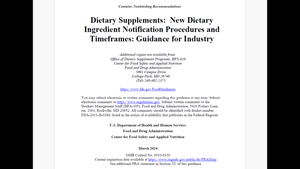CBD sales languishing at retail stores
.png?width=850&auto=webp&quality=95&format=jpg&disable=upscale)
CBD sales in the U.S. are continuing to suffer at retail stores, based on data from SPINS, the wellness-focused data company.
In the 52 weeks ending April 23, sales of supplements containing CBD (as the primary functional ingredient) across the multi-outlet and natural enhanced channels declined about 20% year over year (YOY) to roughly $44 million, said Scott Dicker, market insights director of Chicago-based SPINS. Sales are down from about $54.5 million in the previous 52-week period, he said.
The natural enhanced channel is comprised of stores with $2 million-plus in annual sales and 40% or more of UPC-coded sales from natural/organic/specialty products. The multi-outlet channel covers the grocery and drug outlets, as well as selected retailers across mass merchandisers.
In an interview, Dicker noted the extraordinary growth that CBD achieved a few years ago was not going to be sustainable.
“Everyone was trying it, so that’s what led to the enormous growth back then,” he said, referencing consumer demand for CBD following passage of the 2018 Farm Bill, which removed hemp from the Controlled Substances Act (CSA). “So, I imagine for a lot of people, it [CBD] didn’t work. I think the continued regulatory ambiguity—the stance on that—has really hurt CBD as well.”
Meanwhile, CBD must compete with rising ingredient stars to promote certain health conditions such as mood and sleep support. For example, Dicker pointed to ashwagandha (Withania somnifera), which the American Botanical Council (ABC) reported in its 2021 Herb Market Report achieved the strongest mainstream sales growth for two years in a row.
The SPINS data does feature some bright spots for CBD. For instance, in the 52 weeks ending April 23, CBD water sales (by dollars) are up about 21% to $13.75 million. Based on unit sales, these products increased about 22% YOY.
Joe Dowling, CEO of CV Sciences Inc., a public company which markets hemp products containing CBD, said the lack of a federal regulatory framework, combined with a patchwork of evolving state regulations, are hampering growth in the market.
For instance, he pointed to a law in Minnesota that imposes new packaging requirements. A brand that doesn’t comply with the law can’t be carried on store shelves—and retailers who are out of compliance risk fines—Dowling said. His company made the decision to remain in Minnesota and comply with the new requirements.
“Brands are getting taken off shelves,” Dowling said in an interview, and he suggested the myriad state regulations are adversely impacting dollar and unit sales.
The absence of a federal framework and patchwork approach to regulation in the states, he added, aren’t fostering consumer confidence, and are causing increasing alarm among retailers.
Dowling and other stakeholders in the CBD industry are hopeful that Congress will create federal clarity in the market through the 2023 Farm Bill or other legislation. In May, an FDA official outlined a proposed pathway for CBD in food and dietary supplements, but ultimately, he said, a new regulatory framework “is really in Congress’ hands.”
“The long-term prospect for CBD is good,” Dowling concluded. “We have just got to stabilize some of these problems that we have, and it’s primarily around legislation. And so once we answer … and define that, I think there’s going to be a good flow of investment into better understanding the compound and what it can be used for.”
About the Author(s)
You May Also Like






.png?width=800&auto=webp&quality=80&disable=upscale)